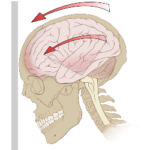
Post-partum Insomnia
One of the most common complaints we hear from our patients is an inability to sleep through the night. The causes for insomnia are so varied that we could see 10 patients with insomnia and there will be a different cause for each. Lack of sleep affects our ability to work, our mood, concentration, immune system, and in general our overall health. As a new mother insomnia can be particularly stressful, as you’re already overworked from your new baby’s needs. We’ve had many successes with insomnia and the cure will typically include learning some better sleep habits, which I’ve written about here. However, I would like to highlight a recent case that reminded me to always think back to physiology, after all, it is our job as clinicians to return our patients back to normal physiology.
Serotonin & Melatonin Needs B12
Our patient in this case is a mid-thirties new mother to a beautiful 6-month old daughter. The mothers main complaints are of anxiety and insomnia. She had sought treatment from her PCP and tried various herbs and vitamins, some of which helped on the surface, but still left an underlying anxiety and inability to sleep. If we ask ourselves, “what is necessary for sleep”, we may come up with many answers, one of them hopefully being melatonin. Melatonin is a hormone produced by the pineal gland that, among other things, will contribute to the sleep-wake cycle by causing drowsiness and a lowered body temperature. Melatonin is manufactured using serotonin. Serotonin is a neurotransmitter responsible for intestinal motility, mood, blood pressure, etc. Lack of serotonin during the day will create symptoms of anxiety and if there isn’t enough serotonin to manufacture melatonin at night you will see both these symptoms together. What these two chemicals have in common, among other things, is that they both require vitamin B12 to be produced. B12 deficiency is quite common, especially in vegetarians and vegans. The mother in this case ate meat, but not often and when she did not in large amounts.
Nature Favors the Young
There are several ways to test for B12 deficiency that go beyond just looking at serum, B12. A discussion on the different ways to test for B12 deficiency is beyond the scope of this article, however, upon testing our patient she was found to be mildly B12 deficient by utilizing an uncommonly ordered lab test. If it were not for breast feeding, this mother may never have shown symptoms of her very mild B12 deficiency. However, nature always favors the young, so the B12 was favorably being given to her baby through breast feeding, leaving the mother with anxiety and insomnia.
Sleep & Calm at Last
Sublingual methylcobalamine (B12) has been shown to be just as easily absorbed and utilized by the body as intramuscular injections of B12. The effects of sublingual B12 were immediate. She felt the anxiety melt away and started sleeping 8-9 hours again. It’s unlikely that this deficiency would ever have been found due to insomnia being a common symptom for new moms. What could have been easily explained away as post-partum depression was actually a an easily remedied vitamin deficiency.


